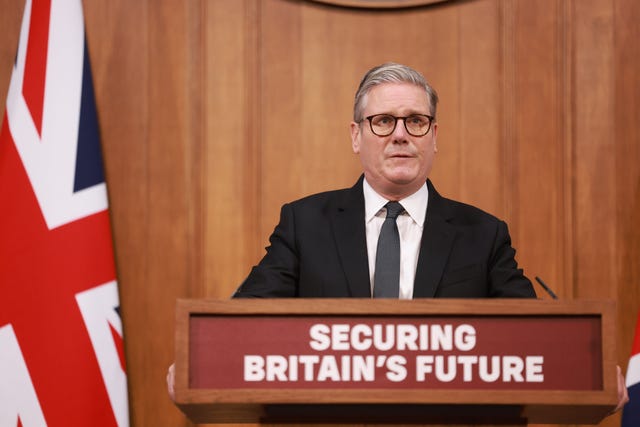Cooper defends Starmer as migration speech likened to ‘rivers of blood’ language
The Home Secretary insisted the tone of the Prime Minister’s migration plan was ‘completely different’ from Enoch Powell’s 1968 anti-migration speech.

Yvette Cooper has defended Sir Keir Starmer amid criticism that his language as he set out plans to crack down on migration echoed Enoch Powell’s infamous “rivers of blood” speech.
The Home Secretary insisted the tone of the Prime Minister’s migration plan was “completely different” from the 1968 anti-immigration speech.
The plans, which are expected to reduce the number of people coming to the UK by up to 100,000 per year, include reforming work and study visas and requiring a higher level of English across all immigration routes.
Labour backbenchers were among those who attacked Sir Keir for the language he used to announce the plans on Monday, including his claim that the UK risks becoming an “island of strangers” if ministers do not act on migration.
In his 1968 speech, Mr Powell said people could find themselves “strangers in their own country” as a result of migration.
Mr Powell was sacked from the Conservative frontbench as a result of making the speech, because it outraged senior Tories at the time.
Asked about the comparison, Ms Cooper told BBC Radio 4’s Today programme: “I don’t think it’s right to make those comparisons. It’s completely different.
“And the Prime Minister said yesterday, I think almost in the same breath… talked about the diverse country that we are, and that being part of our strength.”
Asked if Sir Keir’s speech-writers had been aware of the similarity in language, the Home Secretary replied: “I don’t know.”
She also insisted that critics should focus of the substance of the migration plans, telling Today: “I think we do actually have to be able to have a serious conversation about the policies.
“You’re right. Everybody always gets caught up in focusing on different phrases, but we do have to be talking about the policies.”
Ms Cooper had earlier suggested to BBC Breakfast that the Prime Minister values the contribution of migrants to the UK.
She said: “I think part of the point that he (Sir Keir) is making is that we have to recognise people have come to the UK through generations to do really important jobs in our NHS, founding our biggest businesses, doing some of the most difficult jobs, but it’s because that’s important the system has to be controlled and managed, and it just hasn’t been.”
The Home Secretary also refused to put a number on the amount by which she wants to see net migration reduced because, she said, targets used by the Tories in government had been “meaningless”.
Elsewhere, shadow justice secretary Robert Jenrick claimed the UK “already” is an island of strangers in some places.
“Aggressive levels of mass migration have made us more divided,” he told Times Radio.

Sir Sadiq Khan, the Labour Mayor of London, said he would not have used the phrase “island of strangers”, but declined to criticise the Prime Minister’s announcement on immigration.
He told LBC he thought the Prime Minister was referring to “promises made by Brexiteers” and recent high levels of migration, and not “that contribution we make to this multicultural capital city and country”.
Asked how he felt when he heard Sir Keir’s language, he said: “I read the White Paper and I understand the context of the White Paper, and those aren’t words that I would use.”
In the Commons, the Prime Minister’s announcement on Monday drew criticism from across the political spectrum.
Former shadow chancellor John McDonnell, who lost the Labour whip last year, was chief among those who accused Sir Keir of “reflecting the language” of Mr Powell’s infamous speech.
Labour backbencher Olivia Blake (Sheffield Hallam) suggested the phrase could “risk legitimising the same far-right violence we saw in last year’s summer riots”.
Nigel Farage, whose Reform UK party has focused heavily on immigration in its campaigns, said the Government “will not do what it takes to control our borders”.
The proposals also sparked concern from employers, particularly in the care sector, following the announcement that care worker visas will be scrapped.





